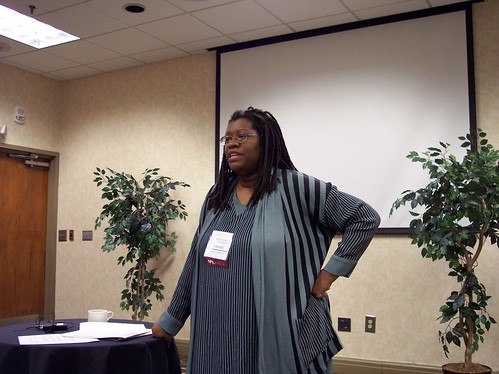Attempting to embed video from YouTube to a post:
Thursday, October 30, 2008
Monday, October 27, 2008
Put Down the Book! (and back away slowly)

Donna Washington in a rare moment of quiet and calm ...
The only thing I knew of worth attending SCLA for this year was the session with Donna Washington, storyteller, and I wouldn't have recognized it in the program if I hadn't gotten a note from my youthlib listserv about it. Why doesn't SCLA at least post vivid descriptions of the sessions on the website? They might not have all the info when the schedule is originally made up, but I went back time and again to find info about the sessions that would make me want to attend them and there was nothing. Friday at 9am only said, "Put down the book: YSS and Trustees, Cathy Pruett/Donna Washington" - that's it! The important bit, Donna Washington, was hidden at the bottom.
Anyway, I was really excited to go to her session and I wasn't disappointed. Donna Washington has been a storyteller since she graduated from college. She was pinpointed as a possible storyteller and then trained to be one. It is all she has ever done. She knows whereof she speaks.
Her first advice was to get a house husband (check!) if you can find one (amen!).
From birth to puberty, a child is geared to language acquisition. They watch the face and body, especially the mouth. (I start watching her mouth now.)
After puberty, they launch into sex mode and language learning goes out the window, but integration of language (collating) kicks in. So it's almost useless to have them writing papers before then.
It's important to look in the eyes of each of your listeners. This is something you can't do when you are reading from the book and your listeners can't look back because they're staring at the book.
They've probably heard your story or the book, but how are you going to tell it? What is this person going to bring that's new to a familiar story? Are you going to just use a flat face? Hope not. Physicalize the good, the bad, and the ugly. How you tell it is more important than what you tell.
Tongue-twisters: they're looking at the mouth and repeating what they hear. (Donna adds "purple" to the Peter Piper tongue-twister, improving the rhythm beyond all knowing. Try it:
Peter Piper picked a peck of purple pickled peppers. Somehow that one word makes it easier.)
The Economy of Gestures: choose your gestures and be consistent. Don't move all over the stage. It takes energy and makes the story into one about you running around. She never moves from the spot when she tells stories, but leaves the listeners with the impression she ran all over the stage.
You can be gigantic in a really small space.
Don't steeple your fingers or put your hands in your pockets.
She performed (with our help, of course) The Squeaky Door.
OMG! Look at that grownup doing that!
The Secret to Sound Effects: people will believe what it is if you tell them that's what it is. (Remember the moose on A Prairie Home Companion: Errrnnh! And the Eland: Errrnnh! and the wapiti: Errrnnh! and the springbok: Errrnnh!)
Don't let your accents fade out. Consistency again!
Just do it!
We performed a few simple activities: Telling a part of a story to a partner (from a short selected list) and then describing what you liked about what the other person did; telling a part of a story and concentrating on your movements (whoah! that was hard); and creating a sound effect and letting everyone else guess what it was. We have terrible trouble following directions, so this should prepare us for working with children!
A few simple rules:
Do not memorize. If you memorize, it sounds memorized.
Do not stop if you've forgotten something. (Yeah, and don't make a face either.) If you get lost in a story, ask the listeners. "Who knows what Epaminondas has in his hands now?" "Butter!" Yessss!
Do not bring a kid up to put in the story. The ones not picked will remember not being picked. :( If they can't do what you want them to do, they get embarrassed. It's cruel - just don't do it.
If you tell a story from another culture, be sure you know what it's about, especially if someone from that culture is there. Don't change it to make it make sense to you. "I can't believe you did that to that story!"
You will never have control over what kids are going to do or say. Live with it.
K through second grade will need to be told in advance that something is going to be scary. (Although, sometimes they freak out too much.)
Give kids opportunities to burst out by participating. Make it as interactive as possible.
Now this is really cool: you go to her website, and there you will see a link to BookHive, which is on the Charlotte-Mecklenberg Public Library site. At that location, you will be able to hear stories told by Donna Washington as well as other talented storytellers, along with suggested reading (if you like that story, you'll like this book!). Dang! PLCMC has all the great ideas! Double Dang!
Thursday, October 23, 2008
Crafty Thursday

For the second week in a row I've been sub'ing in the Homeschooler program. They do a craft activity whilst I ruin their childhood with the 1947 Newbery award-winner Miss Hickory. I say ruin their childhood because wait until they get to the part where Squirrel - I can't go on. Oh, the horror! Already Squirrel has been eyeing Miss Hickory's head and popping up unannounced and uninvited in her bed (I'm not making this up, y'all!) to "keep her warm," he claims. It has become apparent that Fawn's mother is off to the local deer processor. Fawn's father is probably already on someone's wall. Miss Hickory is rendered homeless by a selfish chipmonk ("monk" indeed!). Poor drab Miss Hen-Pheasant has told her tale of abandonment by Cock-Pheasant, probably on account of her moping, lack of intelligence, and low self-esteem. Miss Hickory has advised her to throw the bum out if he comes back.
Fortunately for their sakes, the kids had these nice, colorful beads to play with while I droned on and on about this forest soap opera. Fortunately for me, their regular host will be back to finish this story about a little stick-woman who gets her head torn off by her down-stairs neighbor leaving her body to stagger about and come to the "happy" conclusion that it would never have to do any of that "hard thinking" again. This book is perfect for Halloween! It's chock full of horrors!

Carolyn Sherwin Bailey's Miss Hickory
Saturday, October 04, 2008
Update on Sherman Alexie, 2007 winner National Book Award for Young People's Literature
I was catching up on my sex advice recently by reading my favorite advice column when I noticed a question about a Native American fetish that was answered by the above-named author. Because one of the most popular features of this blog seems to be reviews of YA books (notably Alexie's below), I'm not going to link to it, hilarious as it was. I'm sure, though, that any middle-schooler worth his or her cheetohs can track it down with no trouble. If anyone my age is interested, send me a note and I'll point you in the right direction.
All you middle-schoolers might be more interested in his book, The Absolutely True Diary of a Part-Time Indian...considering there might possibly be something naughty in there, eh? Might actually be worth reading it - the whole thing, you know, not just culling my blog for plot information so you can fake a book report.
Who do you think you're fooling when you do that, eh? I bet you make your mom type it up for you, too, because you're too busy with soccer practice. When I was a girl, we used to have to cross the trackless mud floes to get to school, uphill both ways. We had to write our own book reports by actually reading most of the book and when I say "write" I mean actually write it out on paper with an actual pen we had to make from a quill off of an eagle we trapped with our bare hands (which explains why they were on the verge of extinction). Then we had to gather berries and crush them for ink, unless berries were out of season and then we had to use our own blood.
Where was I? Oh, yeah. We didn't have these fancy computer things when I was a girl where you could look up other people's homework and just cut and paste it into a document. Teachers actually taught stuff, too, instead of spending three quarters of the year teaching us to pass some stupid test to make sure no politico was left behind in the race for government funds. I went back for my 20th college reunion about (mumble mumble) years ago and one of my professors said that ours was the last class that could actually think. We challenged her on that. "Oh, you say that to all the alums!" we chided. "Nope," she said, "it's true. The students now can spew out facts, but they can't make sense of them or use them in any way. They can't draw conclusions."
So, what conclusion do I draw from this? Oh, man, our future is soo effed!
All you middle-schoolers might be more interested in his book, The Absolutely True Diary of a Part-Time Indian...considering there might possibly be something naughty in there, eh? Might actually be worth reading it - the whole thing, you know, not just culling my blog for plot information so you can fake a book report.
Who do you think you're fooling when you do that, eh? I bet you make your mom type it up for you, too, because you're too busy with soccer practice. When I was a girl, we used to have to cross the trackless mud floes to get to school, uphill both ways. We had to write our own book reports by actually reading most of the book and when I say "write" I mean actually write it out on paper with an actual pen we had to make from a quill off of an eagle we trapped with our bare hands (which explains why they were on the verge of extinction). Then we had to gather berries and crush them for ink, unless berries were out of season and then we had to use our own blood.
Where was I? Oh, yeah. We didn't have these fancy computer things when I was a girl where you could look up other people's homework and just cut and paste it into a document. Teachers actually taught stuff, too, instead of spending three quarters of the year teaching us to pass some stupid test to make sure no politico was left behind in the race for government funds. I went back for my 20th college reunion about (mumble mumble) years ago and one of my professors said that ours was the last class that could actually think. We challenged her on that. "Oh, you say that to all the alums!" we chided. "Nope," she said, "it's true. The students now can spew out facts, but they can't make sense of them or use them in any way. They can't draw conclusions."
So, what conclusion do I draw from this? Oh, man, our future is soo effed!
Subscribe to:
Posts (Atom)




